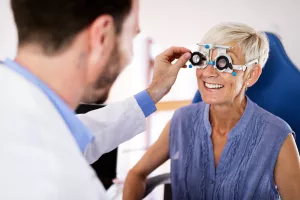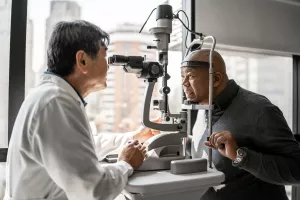Our New England Eye Center (NEEC) ophthalmologists and optometrists provide care for all types of eye diseases and visual conditions such as cataracts, diabetic retinopathy, glaucoma and ocular melanoma.
Keeping an eye on your ocular health
Did you know that we blink more than 28,000 times a day on average? Our visual system works hard to give color to life’s most special moments. But your ocular health can change in the blink of an eye — and this can affect your quality of life as a result.
Whether you need a new prescription for eyeglasses or care for a chronic eye condition, you can count on New England Eye Center to help you see clearly.
We also serve our littlest patients, through pediatric ophthalmology care.

Conditions
We’re equipped to detect and diagnose the full range of conditions that affect your eyes, including:
Our specialities
Comprehensive care
We offer comprehensive eye care services to maintain the health of your eyes. Our team of physicians can diagnose eye conditions, provide medical treatments, and perform eye surgery as necessary
Cornea + external disease
When the clear cornea, or the window of the eye, becomes scarred or cloudy, our specialists provide their medical and surgical expertise to manage it.
Glaucoma
Different types of glaucoma can affect your optic nerve, resulting in pressure on your eye. Our specialists can intervene with medications, lasers or surgery to prevent vision loss.
Neuro-ophthalmology
Your optic nerve connects your eye to your brain, where information is processed. When your visual system is not working properly, our specialists can determine why and intervene to stop the spread of vision loss.
Ocular oncology
Cancer can affect any part of the eye including the eyelids, ocular surface, iris, retina, uvea, and optic nerve. If left untreated cancerous cells can grow and sometimes spread to other areas of your body. Our specialists provide comprehensive cancer care to provide you with the best care possible.
Oculofacial plastic + orbital surgery
Whether it's addressing a droopy eyelid, reconstruction of a blocked tear duct or repairing a bone fracture around the eye, our surgeons provide surgical care for eyelids, the tear-draining system and the orbit, or eye socket.
Optometry
Our optometrists provide comprehensive ocular exams, including ocular health assessment, treatment, and management of ocular diseases and prescribing of eyeglasses and contact lenses.
Refractive surgery
We can correct blurry vision caused by nearsightedness (myopia), farsightedness (hyperopia), presbyopia (loss of ability to focus near), and astigmatism (abnormal eye curvature) by using lasers to reshape the cornea and artificial lenses implanted into your eye.
Uveitis + immunology
Inflammation (uveitis) of the eye causes pain and redness. When left untreated, it can damage vital tissues and lead to vision loss. Our specialists perform a complete diagnostic workup and use both eye drops and systemic medications to control the inflammation.
Vitreoretinal diseases + surgery
Our team of specialists diagnoses and manages a range of retinal diseases including diabetic retinopathy and age-related macular degeneration. They also surgically repair conditions that may harm vision including a detached retina, a macular hole, or an infection within your eye.
Testing
When you walk through our doors, you can count on us to figure out the root cause of your pain, discomfort or vision impairment. We’ll conduct an ocular health assessment, which starts with a review of your health history and may include tests like:
- Color vision testing
- Dilation and fundus examination
- External examination
- Intraocular pressure measurement
- Pupil examination
- Refraction
- Retinal and optic nerve imaging (OCT)
- Slit lamp examination
- Visual acuity testing
- Visual field testing
Treatments
Once we understand your condition, we’ll create a treatment plan tailored to your unique needs. We also have a full-service optical shop, which means you can save time and choose eyeglass frames that fit your style. Here are some of our highlighted treatments:
Cataract surgery
Cataract surgery becomes necessary when the natural lens of the eye loses its clarity, resulting in cloudiness. This cloudiness affects vision and may lead to decreased contrast sensitivity and the appearance of halos around lights, especially at nighttime.
Standard cataract surgery, also known as phacoemulsification, is the most common method for treating this condition. During the procedure, the cloudy lens is broken up using ultrasound technology and then removed. A synthetic intraocular lens (IOL) is then implanted in its place.
If you have multiple eye refraction issues, a specialized lens called a premium IOL can be implanted to address these problems at the same time. Cataract surgery is typically performed as an outpatient procedure, meaning you can return home to recover on the same day as the surgery.
Sometimes cataract surgery requires more specialized equipment, expertise, and planning. We choose this approach for a variety of reasons, including:
- The cataract is advanced.
- You’re living with other eye conditions like diabetic retinopathy or glaucoma.
- Your eye has experienced trauma, such as a significant eye injury.
Refractive surgery
State-of-the-art laser technology allows us to correct many vision problems quickly and without pain. Our refractive surgeons can correct blurry vision caused by nearsightedness (myopia), farsightedness (hyperopia), astigmatism (abnormal eye curvature), or presbyopia (loss of ability to focus at near). Some of these surgeries reshape the cornea and others implant a lens in the eye. We can choose from different procedures based on your specific needs and may opt for one or more of these procedures depending
- LASIK
- Phakic IOL
- PRK
- Refractive lens exchange
- SMILE
Oculofacial plastic surgery services
Oculofacial plastic surgery focuses on the structures around the eyes, including eyelids, brows, forehead and cheeks. Our surgeons are trained in both reconstructive and cosmetic surgery, as well as minimally invasive treatments like Botox and facial soft tissue fillers which can restore function and rejuvenate the eyes and face.
Ocular melanoma care
Receiving an ocular melanoma diagnosis can be a heavy weight to bear, but you don’t have to carry it alone. We’ll work with you, your loved ones and other members of your care team to map a treatment path that’s uniquely you.
Plaque brachytherapy, a special type of radiation therapy for the eyes, is the most common and effective method for treating ocular melanoma. We’re also one of a few health systems in the area that performs Gamma Knife surgery, a safe and painless way to treat tumors without making any incisions.
Macular degeneration care
Age-related macular degeneration (AMD) is the leading cause of vision loss in people 50 years or older. AMD causes damage to the inner part of the retina (macula), resulting in loss of central vision. With AMD, it can be difficult to see fine details either when looking at something close or far away.
There are 2 types of AMD. Most people (80%) have dry AMD where parts of the central retina become thin and can result in slow vision loss. Wet AMD is less common but is more serious. In this type, new, abnormal blood vessels grow under the retina and cause scarring, resulting in rapid vision loss.
Our retina specialists use advanced technology called optical coherence tomography (OCT), a technology developed at Tufts Medicine and now used worldwide, to visualize the retina and stage the disease. We offer the latest in ocular therapeutics to treat both forms of AMD. We are also involved in many clinical studies investigating new therapeutic options, especially when standard medications are no longer working.

From regular office visits to inpatient stays, find the healthcare you need and deserve close to home.

Meet the doctors and care team devoted to supporting you every step of the way along your path to better health.